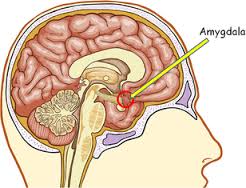amygdala
英 [ə'mɪgdələ]
美 [ə'mɪɡdələ]
amygdala 杏仁体(大脑记忆区域)来自almond的原型。解剖学上因该大脑区域有如两颗杏仁而得名。
- amygdala (n.)
- "the tonsils," 1540s (amygdal), from Latin, from Greek amygdale "almond" (see almond). The anatomical use is as a direct translation of Arabic al-lauzatani "the two tonsils," literally "the two almonds," so called by Arabic physicians for fancied resemblance. From early 15c. as amygdales "tonsils;" as "almonds" from mid-12c.
- 1. The amygdala also sends information back to the frontal cortex.
- 扁桃体也会将讯息传回额叶皮质.
来自互联网
- 2. The amygdala is an executor of stress behavioral, autonomic and neuroendocrine responses.
- 杏仁核是应激性行为反应以及自主神经和神经内分泌反应的执行部位.
来自互联网
- 3. Each lobe includes an amygdala and a seahorse - shaped structure called the hippocampus.
- 颞叶每端各包含一个杏仁体和名叫海马回的海马 状 组织.
来自互联网
- 4. The amygdala had the greatest response to scenes as most emotionally intense.
- 杏仁核拥有对情景的最大反应被定为最大情绪强度.
来自互联网
- 5. In women, the same is true of the left amygdala.
- 女性则以左侧为主.
来自互联网
[ amygdala 造句 ]
